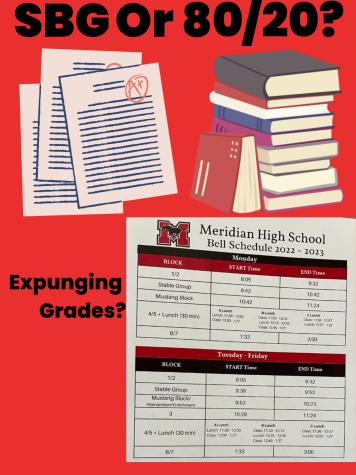New Meridian changes: Schedule, SBG, and more
October 9, 2022
As we’ve already spent a month in the new school year, you may have noticed the many changes and updates have been made in the school curriculum, ranging from the new schedule to the new grading system. In this article, we’ll be covering all you need to know about the new changes this school year and what our student body thinks about these changes.

New Schedule:
Of course, one of the most noticeable modifications in our school may be the new schedule. Although last year’s blocks one and two took place from 8:05 to 9:29 a.m., this year’s blocks one and two last from 8:05 to 9:32 a.m., giving students an extra three minutes of additional learning.
On a more serious note though, the biggest change in our schedule comes from Stable Group and Mustang Block. Every day, with the exception of Monday, students receive approximately 15 minutes of Stable Group time and around 30 minutes of Mustang Block time. However, on Mondays this year, students have a full hour of Stable Group activity and 43 minutes of Mustang Block.
“Stable Group is mostly free time, therefore pointless,” sophomore Adam Belouad argues. “We should have extended Mustang Block instead.”
“I don’t like [the new Monday schedule],” junior Ryan Vagoun adds. “We should have an hour of Mustang Block and 30 minutes of Stable Group.”
Another important change comes from lunch. Last year, lunch was equally split into 4 different blocks, with A-D lunches to accommodate social distancing.
As of this year, lunch has been cut back into just three blocks, with A Lunch starting around 11:30 a.m. and finishing off at 12:00 p.m., B Lunch beginning at 12:15 p.m. and ending around 12:45 p.m., and C Lunch taking place from 12:57 – 1:27 p.m. “I don’t think [the lunch changes] affect the students,” Vagoun explains.
The most important part of this change is that the 15-minute breaks between the three different lunches gives the kitchen staff more time to prepare more meals and clean the messes of the students.
SBG Grading System vs. New 80/20 System:
Standards Based Grading (SBG) was a grading system in which assignments and work were graded on a numerical scale from one to eight instead of the usual letter grading system. This system was used last year, with a score of one or two denoting a “beginner” and a grade of seven earning an “expert.” At the end of the year, these numerical grades would be converted into letter grades before being finalized in PowerSchool.
Under this system, formative assignments, including homework and quizzes, were excluded from students’ final grades while summatives, which included tests, projects, and other large assignments, were worth 100% of the student’s grade. With our new 80/20 grading system, however, formative assessments are now worth 20% of one’s grade and summative assessments account for 80%.
“I don’t like [the new grading system] to be honest, I feel like it puts too much pressure when you’re taking a test,” says senior Tai Bhalla.
Most upperclassmen classes had previously not been operated under Standards Based Grading, so the 80/20 update actually put more weight on summative assignments for many senior and juniors compared to their past years. Meanwhile, many underclassmen experienced SBG in their middle school and high school classes.
“I think I like SBG more because I have more confidence at the end of the semester or the year that I can get a good grade that I feel best represents my progress versus just my standardized grade,” junior Sean Lewin adds. “[However] I don’t mind [the 80/20 system] too much because I think that teachers are aware that they have to better prepare us for the summatives.”
Expunging Grades:
Expunging high school credit classes from middle school has been a cherished act in our school system for many years. “It was good while we had it,” affirms senior Jeremiah Rummingham.
Many students from MEH took high school level courses in math, language, and history. This year, the school administration made a change in policy; expunging grades is no longer available for the class of ‘24 and up. Expunging grades, which is the process of removing high school grades from your transcript, is a necessity for students who have taken secondary school-level courses in middle school and do not want those grades to be reported to colleges on their actual transcripts.
“I don’t know why the school would get rid of it,” Rummingham expressed. “I think it helped [us greatly].”











